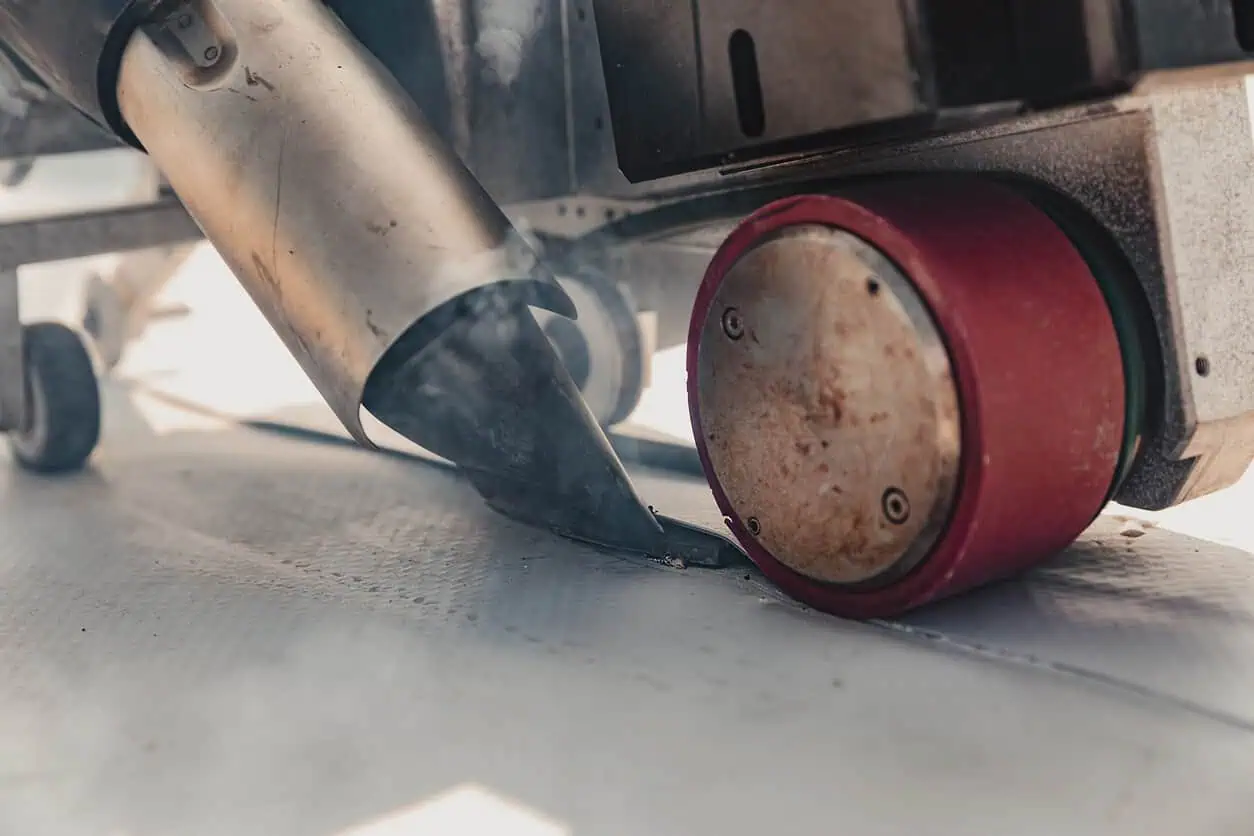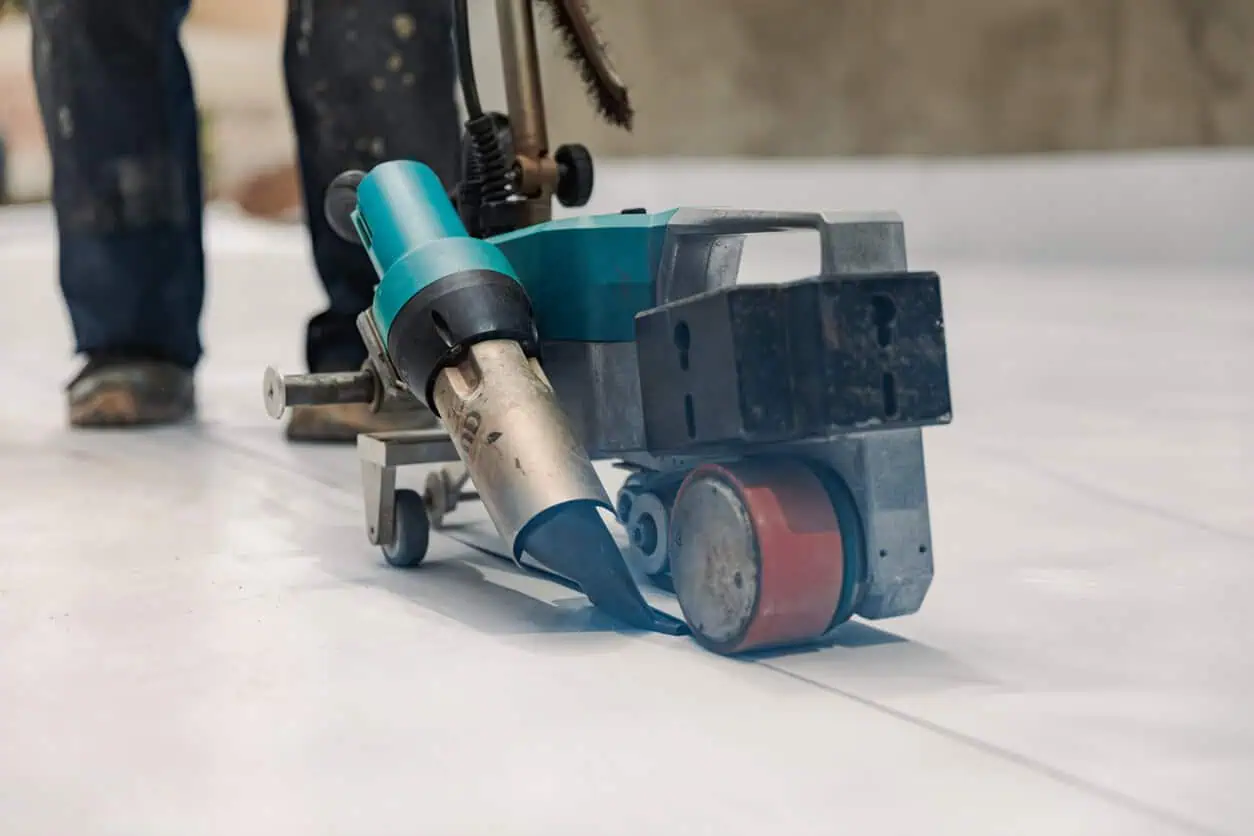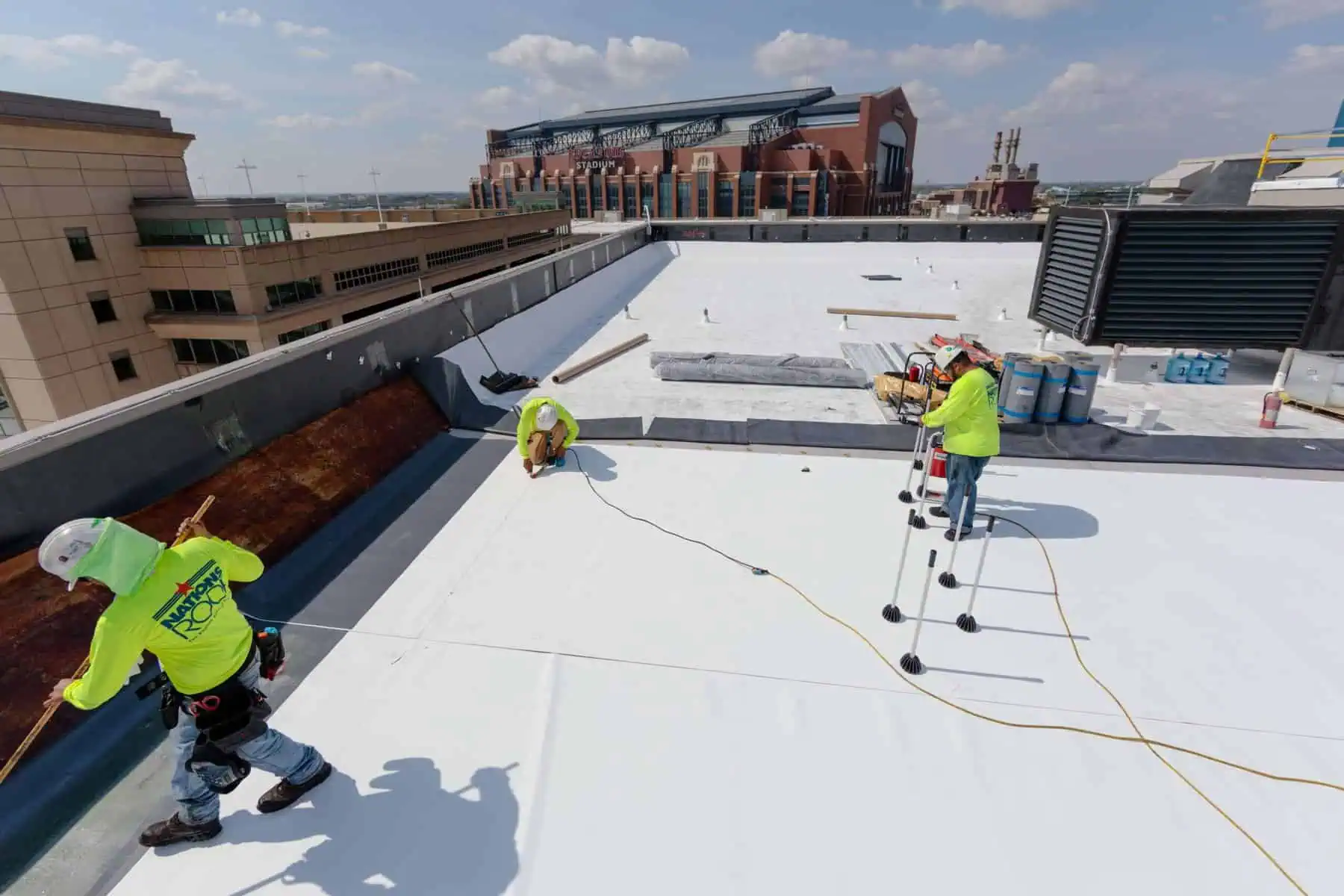Choosing the right material for your roofing project can be a daunting task. Let us help by comparing TPO vs. PVC roofing systems so you can make an informed decision.
TPO, or Thermoplastic Polyolefin, is a single-ply membrane with excellent weather resistance, durability, and strength. On the other hand, PVC stands for Polyvinyl Chloride, a roofing membrane known for its excellent weatherability and flame-retardant characteristics.
Depending on your specific needs, either one of these materials could be the perfect choice for your commercial roofing project.
TPO Roofing (Thermoplastic Polyolefin)
The most common roofing material for low-slope roofs is TPO.
TPO is a single-ply membrane system composed of polypropylene and ethylene-propylene rubber. The TPO sheets are reinforced with a polyester mat and contain UV light inhibitors, pigments, flame retarders, and biocides (that help deter mold, bacteria, rodents, and insects).
TPO roof sheets come in rolls, 6-16 feet wide by 50 or 100 feet long. The seams are heat welded together, providing a strong bond between adjoining sheets. TPO sheets can be mechanically attached, adhered, or ballasted.
The material is waterproof, but it is slippery when wet. This popular type of roofing material comes in different thicknesses (45, 50, 60, or 80 mil) and colors, including white, gray, or tan.
PVC Roofing (Polyvinyl Chloride)
PVC roofing materials are also commonly used on low-slope roofs.
PVC roofing material comprises two layers of PVC with a polyester reinforcement scrim in between the layers. The top layer contains additives that make the membrane UV resistant. The bottom layer is typically darker and contains plasticizers to increase the material’s flexibility. These plasticizers make installation easier.
As with the TPO seams, PVC seams are heat welded together. A rib can be welded to the seams, making it resemble a standing seam roof system (for a much lower price). Like a TPO membrane, PVC membranes are waterproof, but the surface is slippery when wet.
Now that you have a basic understanding of TPO and PVC membranes let’s dig into the critical differences between the two systems.
The Differences Between TPO and PVC Roofing Materials
PVC roofing membranes have been used for more than 60 years, while TPO roofs were introduced 30 years ago.
Here are some of the other differences between the two roofing systems.
Chemical Resistance: PVC roofing systems offer excellent chemical resistance. The membrane is non-reactive to most chemicals. However, TPO membranes may react to oil or exhaust from grease traps.
Fire Resistance: Both PVC and TPO roofing systems have assemblies that meet the standards for fire resistance set by Factory Mutual and Underwriters Laboratories.
Tear Strength and Break Strength of the Material: Tear strength is measured in pound-force per inch. PVC roofing registers at 45 lbf while TPO is 55 lbf – so the TPO roofing membrane is stronger. TPO also has a greater break strength.
Lifespan: The average lifespan of a commercial roof is 17 years. When properly installed and maintained, both TPO and PVC roofs can last well past that, and the manufacturers can provide extended roofing warranties that cover materials and labor.
Price: It’s a mistake to select a commercial roofing system on price alone. You also need to consider the usage, climate, and other matters. However, it may be worth knowing that TPO roofing systems are typically lower in cost than PVC roof membranes.
The Benefits of TPO and PVC Roofing
So, how do you choose between the two materials? As you can see, there are pros and cons to each. When faced with large commercial projects, you need to talk with a roofing authority who can offer expert advice based on the project specifications.
Here are some of the benefits of TPO systems:
- TPO roof sheets are flexible in colder temperatures.
- A TPO system offers high resistance to UV rays. This means that less heat gets absorbed into the building during the summer, which may reduce your energy usage during the hot months.
- A TPO membrane may contribute toward LEED credit qualifications. In addition, most TPO membranes are Energy-Star-rated and approved by the Cool Roof Rating Council.
- A TPO roofing system is highly durable against chemicals, mold growth, and physical damage.
- TPO is a strong material.
- TPO roof materials are available with warranties of up to 30 years.
And here are some of the benefits of PVC roofs:
-
- PVC roofing systems offer 10, 20, or even 30 years warranties.
- PVC roofing offers excellent chemical and fire resistance, which may benefit restaurants, airports, and commercial buildings with grease, oil, and chemical concerns.
- PVC membranes are recyclable.
How to Select Between TPO and PVC Roofing Material
We’ve given you the benefits of both TPO and PVC roofing systems. However, you still may need clarification about what roofing system is suitable for your commercial buildings.
Here are other factors that are considered when roofing professionals bid on jobs.
Current Roofing System: Some roofing systems can be applied directly on top of an existing roof. Reroofing saves you time and money because the older roof system doesn’t need to be torn off before the new system is applied.
State of Your Current Commercial Roof: You may not have the option of reroofing – depending on the state of your current commercial roof. While tearing off the existing roof will cost more money, needing to will give you the flexibility of selecting the best roofing system for your situation.
Existing Structures and Protrusions: Does the roof house HVAC or fire mitigation systems? How many and what types of vents protrude from your structure? Will there be a lot of foot traffic on your roof? The answers to all of these questions play a role in choosing a roof system.
Location of the Building: Of course, the location of the building plays a significant factor in selecting the right type of roofing system. A local commercial roofing company looks at the nearby climate, hazards, and local building codes.
Current Building Usage and Future Plans: It’s important to know if the roofing system is needed for a company with temperature-sensitive inventory or one that must accommodate ventilation and exhaust systems. Of course, some buildings require a comfortable temperature, so you may need a system that improves energy efficiency.
Schedule a Consultation With a Commercial Roofing Specialist
Nations Roof is your go-to source for all your questions about commercial roofing. There are several reasons we stand apart from our competition. We are a full-service roofing company and offer roof repair, maintenance, and new construction.
Nations can help you with your roof at any stage of its life cycle. We also have partnerships with all of the leading manufacturers so that we will install the best roofing system for your unique situation.
Fill out this form on our website, and one of our local specialists will contact you to answer questions or schedule a consultation.






